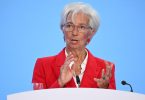TOKYO (Reuters): Aglobal pressure on long-dated bonds extended into Asia on Wednesday, with Japanese yield hitting a record high following rises in Europe and the U.S., while gold scaled a new peak as mounting concerns over government debt and economic growth rattle investors.
The yield on 30-year bonds reached 3.290%, the highest on record. The yield also rose on Japanese debt of other maturities.
Japan has one of the highest ratios of debt to gross domestic product (GDP) of advanced economies.
Prime Minister Shigeru Ishiba’s future has been shaky since elections in July left his government without a majority in the upper house. Opponents of Ishiba within the ruling Liberal Democratic Party (LDP) are seeking to garner enough support for a leadership contest by a Monday deadline.
Japan’s sale of 30-year debt on Thursday will be closely watched by investors around the world, given the recent history of ructions in Tokyo spilling over into other markets, Bloomberg News reported.
European futures, on the other hand, indicated a higher open, but much will depend on whether the bond selloff takes a breather as focus remains on the potential collapse of the French government and the U.K.’s ability to stabilize its finances.
The pan-region Euro STOXX 50 futures were up 0.36%, while German DAX futures gained 0.25%. FTSE futures were flat.
Ben Bennett, Asia Head of Investment Strategy at L&G, said huge fiscal deficits are weighing on long-dated bonds as investors have to absorb significant issuance.
‘Perfect storm’
“I think higher rates in Japan is also a major factor, as global bond markets no longer benefit from the Japanese hunt for yield. It’s a perfect storm for long-dated bonds and a headache for governments.”
Japan’s Nikkei fell 0.69% as worries about the nation’s financial health returned after Ishiba’s close aide said he intended to resign from his post.
MSCI’s broadest index of Asia-Pacific shares outside Japan was down 0.4%.
Attention now turns to services data in Europe for indications of how countries are weathering the unpredictable tariff policies of U.S. President Donald Trump and to key U.S. labor data on Friday for signals on rate cuts by the Federal Reserve (Fed).
Trump on Tuesday said his administration will ask the Supreme Court for an expedited ruling on tariffs that an appeals court found illegal last week. The court allowed for the tariffs to stay in place until Oct. 14.
U.S. manufacturing contracted for a sixth straight month in August as factories grappled with the impact of import tariffs, data showed on Tuesday. Purchasing managers’ indices (PMIs) for the eurozone and Britain are due for release on Wednesday.
U.S. nonfarm payrolls on Friday will be preceded by data on job openings and private payrolls, giving clarity on the labour market that has become the focus of policy debate at the Fed.
Markets widely expect the Fed to lower interest rates later this month, pricing in an 89% chance of a 25-basis-point cut.
The 30-year JGB yield jumped 8 basis points (bps) to a record high of 3.28% as markets brace for a sale of the debt on Thursday.
The yield on the 30-year Treasury was last at 4.985%, just below the psychologically important 5% mark it last hit mid-July.
‘Lot hinges on U.S. jobs report’
“A lot hinges now on the August U.S. jobs report this Friday,” said Vasu Menon, managing director of investment strategy at OCBC Bank.
“If it comes in significantly below market expectations, this could cause long-end yields to ease slightly, although we may not see a big move lower until we get the U.S. August CPI figures on Sept. 11.”
The dollar found its footing, rising 0.3% to 148.79 yen. Sterling eased 0.2% to $1.3367, while the euro last bought $1.163.
The pound slumped 1.1% in the previous session and 30-year gilt yields hit their highest since 1998, underscoring investor angst about the Labour government’s ability to exercise fiscal constraint.
British finance chief Rachel Reeves is expected to raise taxes in her autumn budget to remain in line with her fiscal targets, while in France, Prime Minister Francois Bayrou looks set to lose a confidence vote as opposition parties balk at his cuts to government spending.
Gold prices extended their record run on Wednesday, holding firm above the key $3,500 level and were last at $3,537.81 per ounce. U.S. crude eased 0.2% to $65.41 a barrel.







